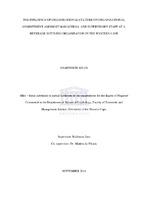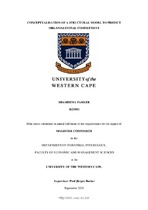The relationship between organisational commitment, organisational citizenship behaviour and turnover intentions at a retail organisation.
Abstract
The South African employment industry is facing exhaustion as the demand for talented workers is higher than supply (Bakos, 2005) and it has become imperative that the employer no longer simply focus on the commitment of employees, but more so on the extra efforts that are exerted by these employees in order to ensure their sustainability (Netswera, Rankhumise & Mavundla, 2005). Extensive research has been conducted on organisational commitment because of its importance in predicting individuals' behaviour outcomes such as absenteeism and turnover (Popoola, 2005). Findings of studies conducted by Bolon (1997) and Maharaj (2006) indicate that there is a positive relationship between organisational commitment (OC) and organisational citizenship behaviour (OCB). Bolino and Turnley (2003) posit that it is important for organisations and managers to have a better understanding of the factors that make employees willing to go the extra mile in order to enhance organisational performance and sustain a competitive edge. The alms of the study are to investigate the relationship between organisational commitment, organisational citizenship behaviour and turnover intentions. Furthermore, it also investigated the relationship between biographical variables (namely, gender, age, tenure and race) and organisational commitment as well as that of organisational
citizenship of human resource professionals A sample of 138 human resource professionals employed at a retail organisation completed a self-developed biographical questionnaire, the Organisational Commitment Questionnaire, the Citizenship Behaviour Questionnaire and the Turnover Intention Questionnaire. Results of the study indicate the existence of a significant relationship between organisational commitment and organisational citizenship and turnover intentions for human resource professionals. The statistical analysis suggests that organisational commitment has a significant relationship with organisational citizenship, whilst turnover intentions did not have a significant impact on organisational commitment. The biographical variables (namely, gender, age, tenure and race) appear to have a significant
impact on organisational commitment, with gender having the strongest relationship with organisational commitment. The biographical variables (namely, gender, age, tenure and race) appear to have a significant impact on organisational citizenship behaviour, whilst
race appeared to be unrelated to citizenship behaviour. Previous studies were reviewed to support the findings of the current study. Limitations of the study and recommendations for future research were put forth in addition to recommendations for the organisation.
Related items
Showing items related by title, author, creator and subject.
-
The influence of organisational culture on organisational commitment amongst managerial and supervisory staff at a beverage bottling organisation in the Western Cape
Ables, Sharneigh (University of the Western cape, 2016)At present organisations are faced with considerable changes in the business environment due to globalisation illustrated through specialisation and individualisation in the workplace (Rastegar & Aghayan, 2012). To stay ... -
The influence of paternalistic leadership on organisational commitment and organisational citizenship behaviour at selected organisations in the Western Cape Province
Veloen, Monita (University of the Western Cape, 2016)Achieving organisational effectiveness and sustainable growth is the ultimate goal of organisations in their quest to deliver the services required by society. -
Conceptualisation of a structural model to predict organisational commitment
Parker, Shameema (University of Western Cape, 2020)As local textile manufacturing come under pressure from global competition, the competitive advantage of organisations in this sector have become an important research topic. As a key input in the manufacturing process, ...




